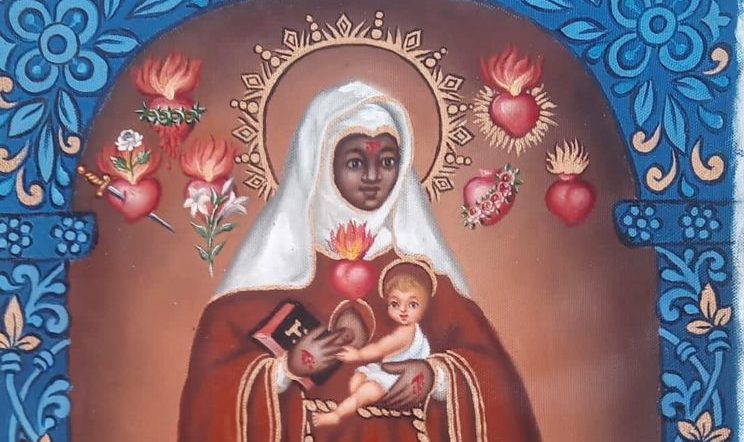Rosa Egipcíaca (1719 – 12 October 1771), also known as Rosa Maria Egipcíaca of Vera Cruz and Rosa Courana, was a formerly enslaved writer and religious mystic. She is the author of A Sagrada Teologia do Amor de Deus Luz Brilhante das Almas Peregrinas (The Sacred Theology of Love of God Brilliant Light of Pilgrim Souls) – the oldest known book written by a Black woman in the history of Brazil.
Early Life
- Born on the Costa da Mina (near present-day Lagos, Nigeria), a member of the Coura people.
- Enslaved at age six and brought to Rio de Janeiro in 1725 via the Atlantic slave trade.
- Baptized at Igreja da Candelária and renamed Rosa or Rosa Courana.
- Sold in 1733 to Dona Ana Garcês de Morais, who owned a mining camp in Minas Gerais.
- Previously sexually abused by her former enslaver, José de Souza de Azevedo.
- Forced to work as an escrava de ganho (enslaved woman who earned money) in a mining camp of 77 enslaved men.
Religious Life
- At age 29, began experiencing visions following a mysterious illness (possibly a venereal disease).
- Exorcized by Catholic priest Francisco Gonçalves Lopes; they were later accused of having an affair and tried by the Inquisition.
- After her release in 1748, she renamed herself Rosa Maria Egipcíaca da Vera Cruz.
- Preached her visions publicly and was accused of witchcraft in 1749; flogging left her partially paralyzed.
- Fled with Lopes to Rio de Janeiro, where she gained the support of Franciscan clergy.
- Learned to read and write after a vision of St. Anne.
- Authored A Sagrada Teologia do Amor de Deus Luz Brilhante das Almas Peregrinas, the first book written by an Afro-Brazilian woman.
- Founded the Recolhimento de Nossa Senhora do Parto convent in 1754, welcoming mostly Black, multiracial women and former prostitutes.
- Blended Catholic and West African spiritual practices, incorporating elements like batuque dancing.
- Claimed prophecies, including a flood that would carry her convent to Portugal to marry King Dom Sebastião.
- Developed a new form of rosary prayer: "the Rosary of Santana."
Arrest and Death
- Arrested in 1762 for involvement in the cult of the Sacred Heart of Jesus.
- Tried by the Inquisition in Lisbon between 1763 and 1765.
- Worked as a kitchen servant for the Inquisition after her final interrogation.
- Died of natural causes on 12 October 1771.
A Sagrada Teologia do Amor de Deus Luz Brilhante das Almas Peregrinas
- Details Rosa's visions, including mystical interactions with Christ and spiritual experiences.
- Originally 290 pages; only six pages have survived.
- Considered the earliest surviving literary work by a Black woman in Brazil.
Legacy
- Inspired the 1997 novel Rosa Maria Egipcíaca da Vera Cruz by Heloísa Maranhão.
- Honored by the feminist organization Criola in Rio de Janeiro.
Historiography
- Her life was largely unknown until Luiz Mott published Rosa Egipcíaca: Uma santa Africana no Brasil in 1993.
- Mott used Inquisition records, Rosa's surviving writings, and Portuguese archives.
- Scholars recognize her as both a saint and a sinner, challenging the Catholic Church’s categories for women.
- Matthias Röhrig Assunção emphasized her status as a figure of Afro-Brazilian devotion.
- Paul Christopher Johnson identified her as a “healing saint” and cultural symbol.
- Díaz and Quispe-Agnoli highlighted the rarity of preserved African women’s voices in colonial Latin America.
References
- YouTube: ESCRAVIZADA, MERETRIZ, SANTA: CONHEÇA ROSA EGIPCÍACA – EDUARDO BUENO
